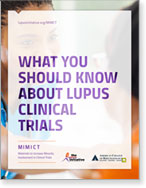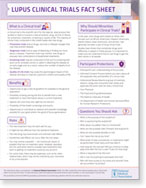Patient Materials
Patients prefer to learn about clinical trials from their providers. All providers, including primary care providers, nurses, physician assistants, nurse practitioners and any non-specialists can raise awareness about lupus clinical trial opportunities.
When short on time, direct patients to these online materials to learn more about clinical trials. Or, print and distribute them while making clinical trial referrals:
Participating in a Clinical Trial
What You Need to Know
The videos below can be viewed with English and Spanish closed captions (subtítulos en español).

Video Length: 01:48
Participating in a Clinical Trial
What You Need to Know
What is a Clinical Trial and Why Should I Participate?
Speaker 1: A clinical trial is a research study that aims to evaluate how an intervention response in different patients. This is the main way that researchers can determine whether a medication is good or not. One of the things that I realized is there are a lot of people that don’t know about clinical trials. There are a lot of people that don’t know what a clinical trial is. For me, I was a little confused as to what is a clinical trial, and what is a research study, and what is the difference? I think to understand because, again, there’s a lot of misconception, it gets very confusing, but a clinical trial to me, is something that they give you, a treatment plan that they’re trying to figure out if it’s going to make you better or work.
Speaker 2: Participating in a clinical trial offers opportunities to patients with lupus, specifically, those that don’t have their disease under control, and that has failed other medications.
Speaker 3: Without participation in clinical trials, there can be no new drug treatments. I am very keen on wanting there to be a cure for lupus. If there’s anything that I can do to participate, to help myself or the next person, I am definitely willing to do.
[00:01:48] [END OF AUDIO]
Video Length: 01:44
Participating in a Clinical Trial
What You Need to Know
What Kind of Care Will I Receive While in a Clinical Trial?
Speaker 1: What can they expect from a clinical trial, if you’re a lupus patient? You can expect to have people who really care about you. You can expect not just one physician, but a whole team of physicians, nurses, medical assistants, they’re there for you 24 hours a day. That is probably the biggest difference between being in a clinical trial and just being at the clinic. The clinic’s going to say, “Here’s your doctor, here’s your nurse. They’re going to take care of you.” Absolutely.
Speaker 2: A patient with lupus who gets involved in clinical trials can expect to have a very structured setting where they will be monitored very closely, where they will have access to physicians and other care providers, to determine how they’re responding to both their baseline medications and the addition of a new medication.
Speaker 3: For me, it was reassuring that I was going to be okay, because not only was my provider checking all my labs, but I had another doctor that was also checking. For me, it was a good experience, just being there and knowing that somebody does care and that somebody is there to help you and answer any questions.
[00:01:44] [END OF AUDIO]
Video Length: 01:53
Participating in a Clinical Trial
What You Need to Know
What are the Risks and Benefits of Participating in a Clinical Trial?
Dr. Wambui Machua: Patients with lupus can benefit from a clinical trial first and foremost because they will be part of the new medications that are being developed for lupus. Also, they will get personalized attention for their lupus care because you get one-on-one followup and close follow up.
Dr. Fabian Sandoval: Some of the risks associated with the clinical trial would depend on the study that you’re engaged in. Some of them have very little risk like the risk is you’re going to have diarrhea. Others are going to be more severe. That’s why we have such a big team of healthcare providers watching over you to make sure if you are developing that little extra rash or a dry cough or some dry eye or whatever it is, you tell us, “Hey, this doesn’t feel right,” and we are there to help you resolve the issue.
Dr. Ashira Blazer: I think it’s important to say that, any person who enrolls in a clinical trial can withdraw at any time and so it is not a coercive process. A person can decide to participate, a person can decide to leave, and that might happen for any number of reasons.
Dr. Laura Geraldino-Pardilla: Lupus patients participating in clinical trials need to have a very detailed discussion with their providers to go through all the potential risks for their health by participating in a clinical trial, not just the benefits.
[00:01:53] [END OF AUDIO]
Video Length: 03:28
Participating in a Clinical Trial
What You Need to Know
What Questions Should I Ask Before Enrolling in a Clinical Trial?
Speaker 1: I think a couple of questions that I would ask if I was in the room with my sister as she was participating in the clinical trial is, what is this clinical trial for? What is the objective? What is the goal of the clinical trial? Number two, what kind of treatment is it going to entail? Is it going to be injections? Is it going to be something that you’re going to be taking orally or is it some sort of therapy? What does it entail? What does the study entail? Also, how long is the study? Is it a month? Is it six months? Is it one year?
Also, what are the side effects that they have seen if they know of any, or what are any negatives that they might want to talk to us about or any negative impact that it might cause her if they know of any? Because, obviously, with clinical trials, you don’t know, and that’s why it’s a clinical trial to see if the medication is going to work on a patient, but if they know of anything, then it would be good to know.
Also, is there an opportunity for the patient to actually step out or stop the treatment if they’re getting adverse reactions or if they’re getting ill? Can they opt-out? Finally, what are the results? Once it ends, does the patient continue the treatment or does the treatment stop, or what happens before, during and after a clinical trial? I think it’s very important.
Speaker 2: I think one of the first questions is what phase of the trial is this? There are different phases of clinical trials. The first phase may focus on safety, the second phase may focus on how effective is the drug and at what dose of medication, and then the third phase is a wider trial, looking at both safety efficacy and side effect profile. It’s important to know what phase of the trial you’re participating in so that you understand what you may or may not be able to expect.
Speaker 3: Some of the questions that I would ask my provider before participating in a clinical trial would be, is it the right trial for me? Will I be having side effects, any symptoms or will it interfere with the medication that I’m currently on?
Speaker 4: How long will the trial take? How much of your time? I think it’s best to ask every question that comes to mind. There’s never too many questions that you can ask. I think it is very important to be upfront with everything that you’re experiencing because it can only help the situation. If they’re going to be any barriers in terms of you going to the clinic, not being able to take off work, or not having transportation. If you’re worried about if there’s going to be anything monetary associated with participating in a trial.
[00:03:28] [END OF AUDIO]
Video Length: 01:31
Participating in a Clinical Trial
What You Need to Know
Who Should Participate in a Clinical Trial?
Speaker 1: For African-Americans and Latino patients, it is particularly important to participate in clinical trials because lupus is a disease that is more common in these groups, and not only more common but also starts at an earlier age. It’s associated with more severe disease and higher mortality rates.
Speaker 2: If we don’t try these medications on our diverse populations, we’re not sure if it’s going to work on our children and great-grandchildren. We as the diverse Hispanic, African-American communities participating in studies, we know that we are effectively contributing right now to helping those later on.
Speaker 3: I feel like participation in a clinical trial is kind of like your life is dependent upon it. If it’s not you, then who? Participation is key just to learning again what different ethnicities, different genders, how it will impact them. We can’t have a voice if we don’t participate.
[00:01:31] [END OF AUDIO]
This project was supported by Grant Numbers 1 CPIMP171138 and 1 CPIMP181166 from the U.S. Department of Health and Human Services, Office of Minority Health (HHS, OMH). Its contents are solely the responsibility of the authors and do not necessarily represent the official views of the HHS, OMH.



